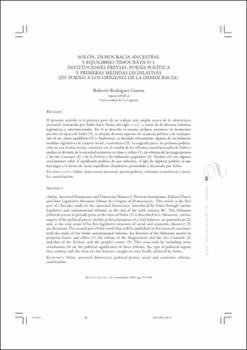Solón, democracia ancestral y equilibrio timocrático (I). Instituciones previas, poesía política y primeras medidas legislativas (en torno a los orígenes de la democracia)
Fecha
2009Resumen
El presente artículo es la primera parte de un trabajo más amplio acerca de la «democracia ancestral» instaurada por Solón hacia finales del siglo VI a.C. a través de de diversas reformas legislativas y constitucionales. En él se describe el sistema político ateniense en momentos previos a la época de Solón (1), se señalan diversos aspectos de su poesía política y de su propósito de un «justo equilibrio»(2) y, finalmente, se abordan críticamente algunas de sus primeras
medidas legislativas de carácter social y económico (3). La segunda parte, de próxima publicación en esta misma revista, continúa con el estudio de las reformas constitucionales de Solón y analiza su división de la sociedad ateniense en clases y tribus (1), su reforma de las magistraturas y los dos Consejos (2) y de la Ecclesía y los tribunales populares (3). Finaliza (4) con algunas
conclusiones sobre el significado político de esas reformas, el tipo de régimen político al que dan lugar y la forma de «justo equilibrio» finalmente pretendido o alcanzado por Solón. This article is the first
part of a broader study on the «ancestral democracy» introduced by Solon through various
legislative and constitutional reforms, at the end of the sixth century BC. The Athenian
political system in periods prior to the time of Solon (1) is described in it. Moreover, various
aspects of his political poetry and his political purpose of a «fair balance» are pointed out (2)
and, at the end, some of his first legislative measures of social and economic character (3)
are discussed. The second part of this work (that will be published in this journal) continues
with the study of the Solon constitutional reforms, his division of the Athenian society in
property-classes and tribes (1), his reform of the Magistracies and the two Councils (2)
and that of the Ecclesia, and the people’s courts (3). This essay ends by including some
conclusions (4) on the political significance of these reforms, the type of political regime
they endorse and the form of «fair balance» sought or even finally achieved by Solon.






